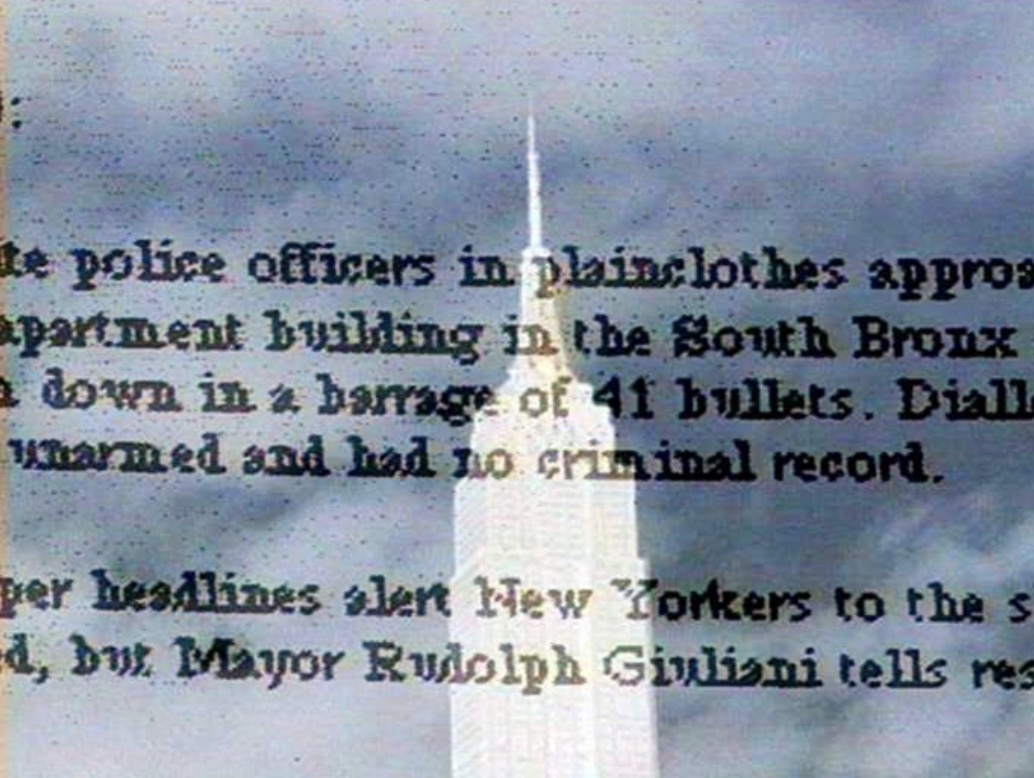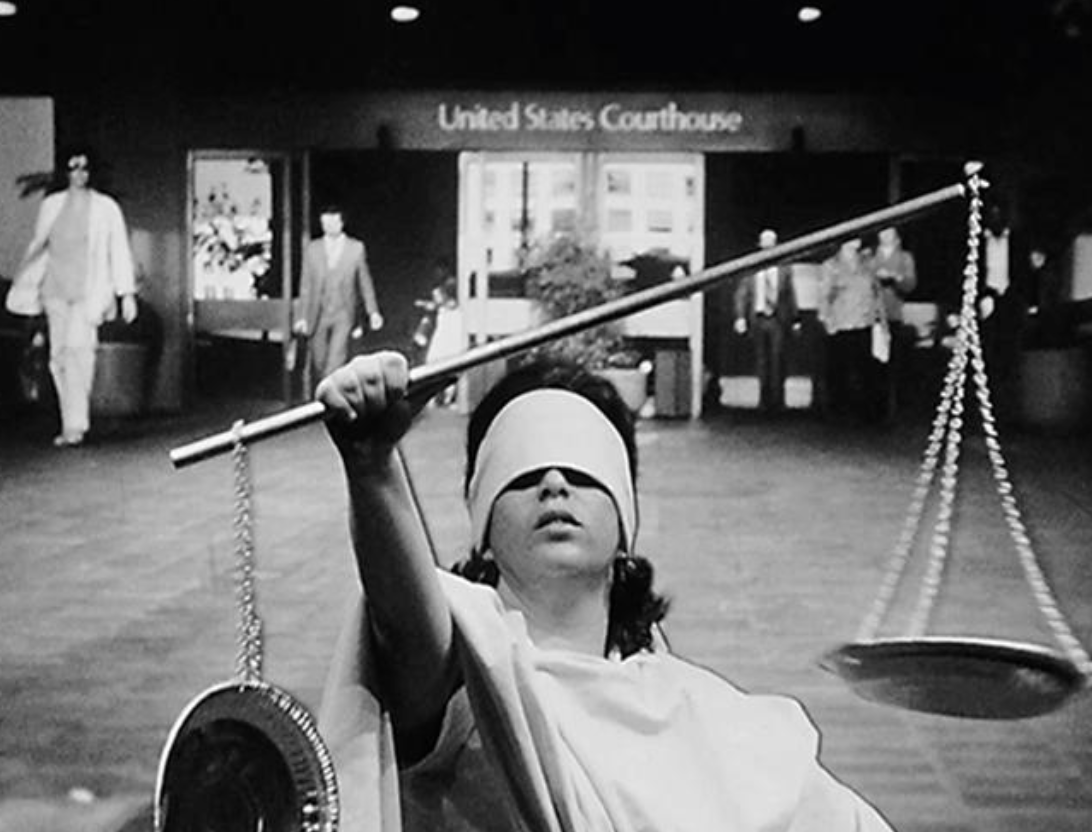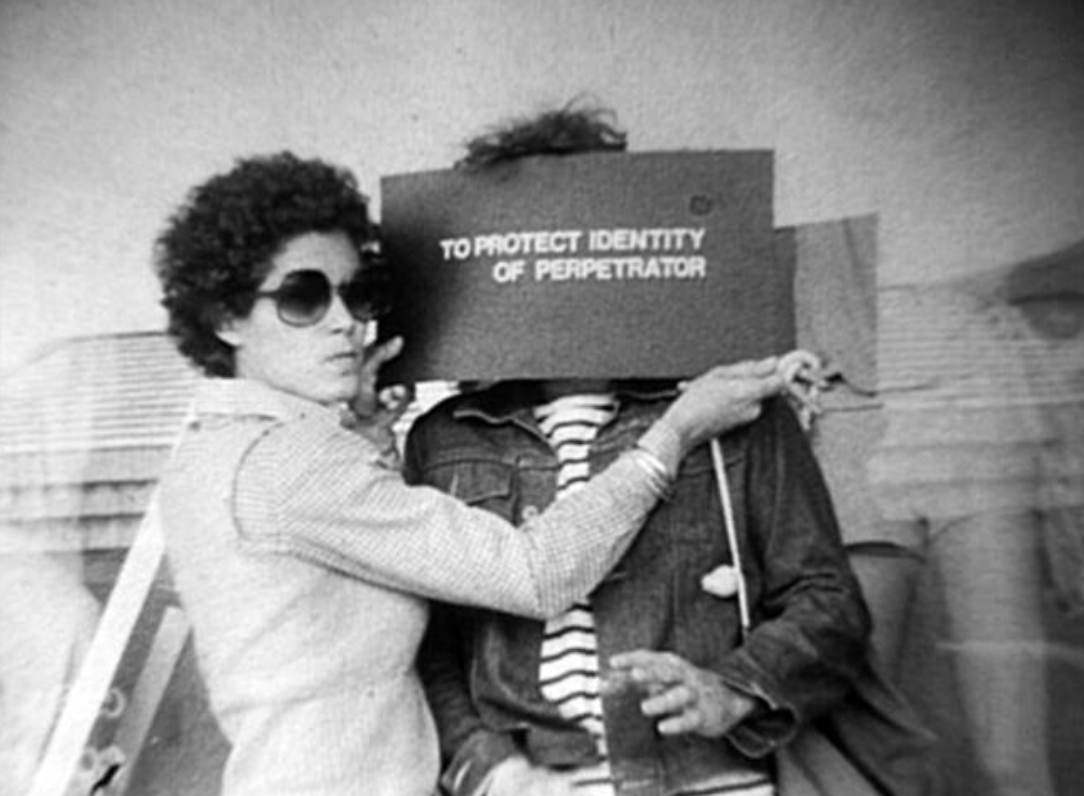UnionDocs presents a trilogy of films by Sherry Millner and Ernest Larsen that delve into questionable transgressions and conventional definitions of criminality. Following the screening, Ruth Wilson Gilmore and Craig Gilmore will join Millner and Larsen in a conversation about the politics of misconduct and corruption.

- This event has passed.
May 5, 2019 at 7:30 pm
Three Crimes
With Sherry Millner, Ernest Larsen, Ruth Wilson Gilmore and Craig Gilmore
Program
Shoplifting: It’s a Crime?
Directed by Millner, scripted by Larsen
15 min., 1979
An ‘educational’ documentary on the evils of shoplifting is itself shoplifted, mocked, and then remade or extrapolated on the Proudhonian principle that ‘property is theft,’ with the figure of the shoplifter freed from the zone of morality and re-situated as a vital part of an alternative economy. The dual aim is to shake up the disciplinary role of the educational doc as well as conventional definitions of criminality.
Crime Around the Collar
Directed by Millner, scripted by Larsen
40 min., 1981
An experimental doc about an invisible issue: white-collar crime.
Barbara Kruger’s review in Artforum of a 1984 screening in New York, astutely notes, “when Millner asserts that it is the industrial park and not the slum that is the greatest breeder of crime, she alerts us to a cannily invisible kind of swindle… This absent operative defines the film’s agenda to display the hidden injuries of class and to make the invisible beneficiaries of hidden financial gains accountable. And visible.”
41 Shots
Co-directed by Millner & Larsen
16 min., 2000
On February 4, 1999, 19 of the 41 shots fired in 10 seconds by 4 NYPD Street Crimes Unit cops hit Guinean immigrant Amadou Diallo as he stood in the vestibule of the building where he lived in the Bronx…. This video essay seizes on the grotesque factual precision of this numerical data, proceeding with an intense contemplation of how police violence is produced and then addressed by other forces on the city streets.
Carnivalesque scenes of heavily-policed demonstrations and parades intimate both the possibility of resistance and a vision of the city as necropolis. Ghostly images of windows reflect the sinister theorization underlying the nationwide ratcheting-up of police activity known as the “broken windows” theory of criminology, leading to zero tolerance toward the most minor of offenses. In 2000, we posited that the police murder of Amadou Diallo was a template for a dark future—an assertion that after the events in Ferguson in 2014 and the subsequent rise of Black Lives Matter, was grimly established in public discourse.
Prizewinner at Oberhausen film festival, 2001
84 min

Sherry Millner (College of Staten Island, CUNY) was the initial Chair of the Media Culture Department. Millner’s projects have been described as radical interrogations of the dynamics of genre and communicative systems, while overturning remaining distinctions between public and private. Her many films and videos have been exhibited at film/video festivals throughout the U.S. Europe, Australia, and Asia, at major museum exhibitions, including two Whitney Biennials, and is distributed by Video Databank. Her photomontages and photo-text pieces have been published in many journals including Heresies, The Independent, Social Text, Public Culture. Beginning in 2006, she initiated a series of curatorial projects in film and video including State of Emergency (first iterated as a public video projection), Border-Crossers andTrouble-Makers for the 2008 Oberhausen Film Festival, Reclaim the Future at the 2009 Subversive Film Festival in Zagreb, and a program for the Visible Evidence Conference in 2011. She is currently co-producing Disruptive Film & Video: Everyday Resistance to Power, a new history of radical/ experimental short film and video, as a four-DVD set to be distributed by Facets MultiMedia. Her collaborative photo-text series, Notes from Europe, initially available on the Social Text website, was published in book form as Capital’s Greek Cage by Autonomedia in 2013. Her video Rock the Cradle (2013) has been exhibited in Barcelona, in Thessaloniki, Greece, Pori, Finland, Belgrade, Serbia, and Chicago,Illinois (at the It’s the Political Economy, Stupid exhibitions), and in Glasgow and Edinburgh, Scotland (withit the Economy exhibitions). Excerpts of her ongoing photomontage series No Ventilator Included were published in Printed Project (Dublin, Ireland). Her work is featured in such books as The M Word, Feminist Art and the Maternal; Space,Site, and Intervention: Issues in Installation and Site-Specific Art; in Digital Desires; and in Re-Framings: New Feminist Photography. In addition to festival awards for her films and videos, she has been the recipient of residencies, and grants from NYFA, NYSCA, the Jerome Foundation, Long Beach Museum, the Ucross Foundation, Can Serrat, Babayan Culture House, and Light Works, among others.
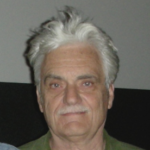
In addition to many film and video collaborations with Sherry Millner, Ernest Larsen writes fiction and media criticism. His criticism has been published in The Nation, Art in America, The Village Voice, Art Journal, The Independent, Exposure, Transition, The American Quarterly, Jump Cut, and Arena, along with essays in a number of anthologies. He wrote a book-length study of the film The Usual Suspectswhich was published in the British Film Institute Modern Classics series. His novel, Not a Through Street, was nominated for an Edgar. Also a scriptwriter and contributing producer for several PBS series, he has received grants, residencies, and awards from the Jerome Foundation, Paul Robeson Foundation, MacDowell Foundation, Blue Mountain Center, Gunk Foundation, and the Blumenthal Foundation. His collaborative video projects have been exhibited and won awards at major festivals throughout the world (London, Sydney, Berlin, Barcelona, Amsterdam, Dallas, Los Angeles, etc.) including two Whitney Biennials. With Sherry Millner, he has co-curated film/video series for the Oberhausen Film Festival and the Subversive Film Festival in Zagreb. He co-produced the film projections series State of Emergency and in 2013 co-curated a film series for the Flaherty Foundation, at Anthology Film Archives in New York, Global Revolt.

Ruth Wilson Gilmore is Professor of Earth & Environmental Sciences, and American Studies at the Graduate Center of the City University of New York, where she is also Director of the Center for Place, Culture. She writes about abolition, racial capitalism, organized violence, organized abandonment, changing state structure, the aesthetics and politics of seeing, and labor and social movements. A second edition of Golden Gulag will appear soon, along with two collections of essays. Recent publications include “Beyond Bratton” (with Craig Gilmore, in Policing the Planet, Camp and Heatherton, eds.), and “Abolition Geography and the Problem of Innocence” (in Futures of Black Radicalism, Lubin and Johnson, eds.). Gilmore has lectured in Africa, Asia, Europe, and North America, and is working on a number of inter- and transnational projects. She is a co-founder of many grassroots organizations including California Prison Moratorium Project; Critical Resistance; and the Central California Environmental Justice Network. Honors include the American Studies Association Angela Y. Davis Award for Public Scholarship (2012); the Association of American Geographers’ Harold Rose Award for Anti-Racist Research and Practice (2014); the SUNY-Purchase College Eugene V. Grant Distinguished Scholar Prize for Social and Environmental Justice (2015-16); and the American Studies Association Richard A Yarborough Mentorship Award (2017).
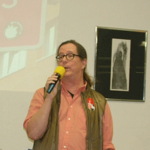
Craig Gilmore is an organizer with the California Prison Moratorium Project and active in the Central California Environmental Justice Network, the Real Cost of Prisons Project, and Education not Incarceration.

